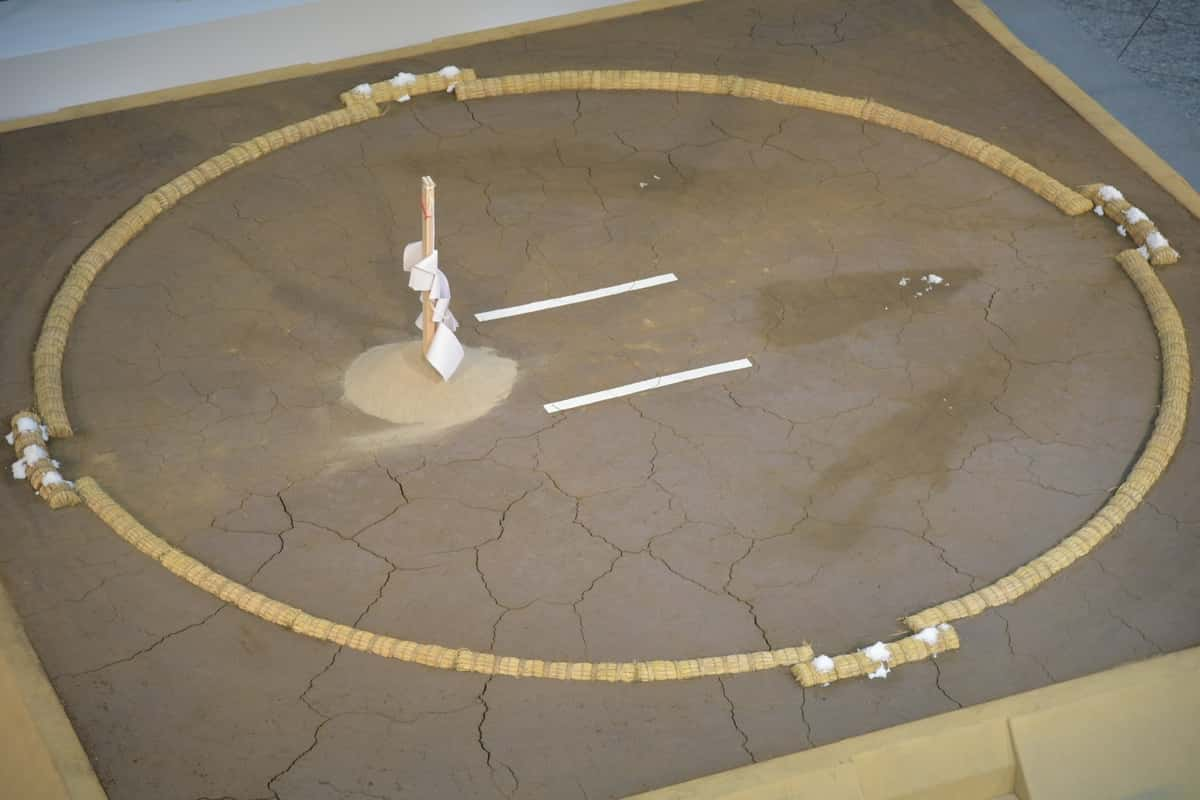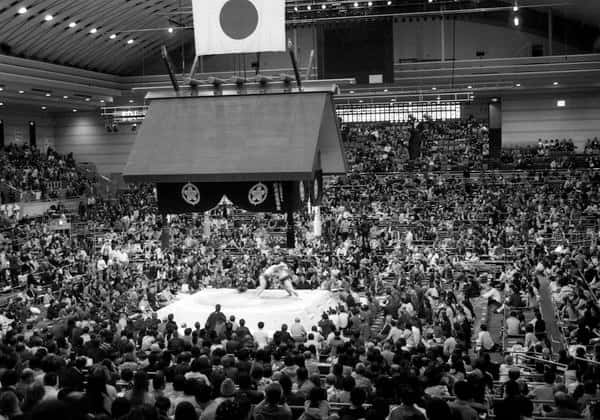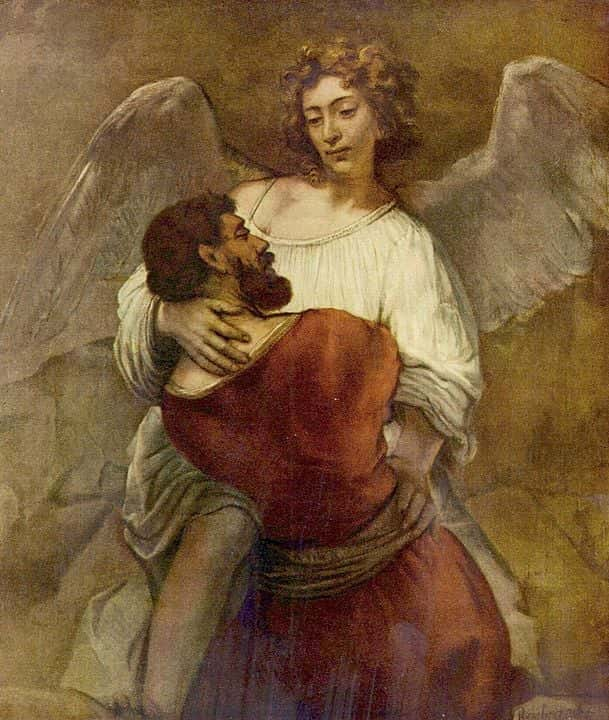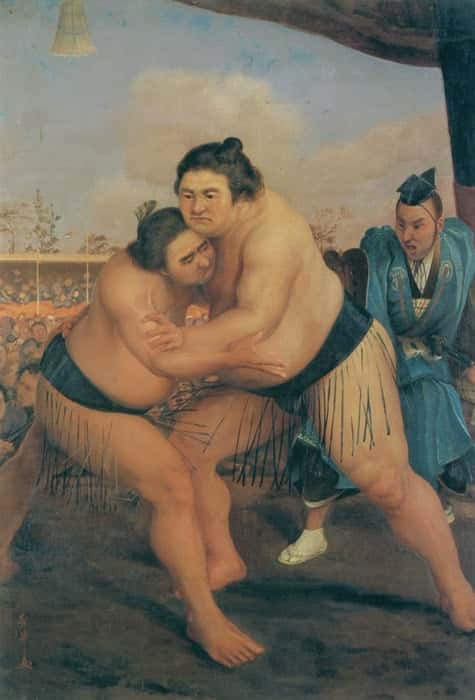目次
- The bombshell said on the show “Sukkiri”!
- The history of Sumo is a little different from that of other sports.
- Is the word “sumo” derived from Hebrew?
- The Wrestling Match between Jacob and the Angel of God
- “Hakkeyoi” means “I’m coming to get you.”
- The word “nokotta” means “to knock down.”
- ”Hakkeyoi” and “Nokotta” both originate from Hebrew
- Conclusion
The bombshell said on the show “Sukkiri”!
Former Yokozuna, Takanohana headmaster Koji Hanada (46) appeared live on TV information program “Sukkiri ” that aired on November 27, 2018. On this show, Hanada abruptly interjected, “[The word] ‘sumo’ is not Japanese, but it is a Hebrew word. The [modern] kanji reading for sumo is 相撲, which is used only as a phonetic marker, so it’s not Japanese. ‘Sumo’ originates from the word ‘shumo’ in Hebrew.” This statement caused a huge controversy and started a ripple effect. The former headmaster probably wanted to say that since sumo-do itself is a martial art that originated from West Asia, one needs to think of sumo not only as an ancient Japanese sport or a martial art, but also a martial art that is open to the world. This is why he said, “I hope that these ideas will be useful for the world.”
It’s not surprising that the public was confused that a former Yokozuna suddenly started talking about the Hebrew language, as if sumo’s roots were not actually in Japan. What is Hebrew, anyway? Hebrew is the language of Israel and has been used by the Jewish people since ancient times. If the word “sumo” is actually Hebrew, it would imply that Japan’s ancestors were connected to the people of Israel, i.e., the Jewish people, which is an argument similar to the Japanese-Jewish syncretism theory. The Japanese-Jewish syncretism theory reconsiders how ancient history is based on the premise that the ancestors of Japanese people came from Israel and created the basis of Japanese culture. This hypothesis is making modern Japanese re-examine what went in on history. Using this theory as a foundation for his hypothesis, the former great Yokozuna claims that the word “sumo” was actually a foreign word and not a Japanese word like how everyone originally thought; perhaps some people are perplexed by this realization.
Many in the media have picked up on this comment and are concerned that the word has become an occult. Has the former Takanohana become brainwashed by the occult? Or is there a solid basis for the claim that sumo is a Hebrew word? A study of the word “Sumo” and the roots of the call “Hakeyoi nokotta” used in sumo, leads to a surprising conclusion.
The history of Sumo is a little different from that of other sports.

Dohyo, a sacred ring where sumo wrestling is heldWhat differentiates sumo from other sports is that it is not simply a fight between wrestlers, but also has a background of Shinto rituals and festivals that are connected to Japan’s unique religious culture. Therefore, it is a sport with a strong ritualistic flavor with aspects of budo and bugei (martial arts), with religious rituals that are unparalleled in any other sport. Among the festivals held at shrines throughout Japan, there are many rituals called dedication sumo. Therefore, when tracing the etymology of the word “sumo,” we must not forget that Shintoism lurks in the background.

Does sumo, a sport that has a massive following in Japan, actually have its roots in Israel?In the books Kojiki and Nihon Shoki, there are several references to the sport’s possible origins. One legend of conquering the land of Ashihara no-nakatsukuni tells of the struggle between Takemikazuchi and Takeminakata in which the latter grabbed Takemikazuchi’s arm and attempted to throw him during the conquest from ancient mythical Japan. It has been theorized that this is the oldest recorded sumo wrestling match in Japan. Later, during the reign of Emperor Suinin, it was written in Nihon Shoki that one day the emperor himself wished to see a match between warriors, and Nomisukune and Taima-no-Kehaya engaged in Tenran Sumo. This event is considered to be the earliest sumo tournament. In the Yayoi period before the Kofun (ancient tomb) period, sumo wrestling was adopted as an agricultural ritual, and it is thought that this event became a festival to predict the harvest of crops, and eventually came to be used as a yearly entertainment ritual in the imperial court. Then during the Heian period (794-1185), sumo developed as a unique martial art that was performed in the imperial court, and continued to develop as a Japanese sport for more than three centuries.
Later in the Edo period (1603-1867), sumo developed into a professional sport and the grand sumo tournament was started. Considering that sumo is a contest of power, one kanji usage for sumo came to be 角力 or “kakuriki,” meaning “a contest of power”. This phonetic kanji reading was used between the 19th to the beginning of the 20th century.
Is the word “sumo” derived from Hebrew?
How did the term “Sumo” come to bee-on-one matches? The origin of the term “sumo” is not clear. According to one theory, the word “sumahu” or its conjugated form “sumahi,” which means “a contest of strength or skill” then changed to “sumo” over time. The fact that the Chinese characters of “sumo” and “sumahi” were already written in Wamyosho in the Heian period (794-1185), and since the word was thought to have originally have a pronunciation that was similar to “sumahi” in ancient times adds credibility to the idea.
Contrary to this popular belief, there must be a good reason for former Takanohana Oyakata’s public statement that the word “Sumo” is Hebrew. He asserted that the word “sumo” is “originally a Hebrew word “shumo,” which is written in Hebrew as שמו. The root of the Hebrew word is שמ (shem) , and it means name. Adding the ending ו changes the meaning of the word into “his name”. What association does the phrase “his name” have with “sumo”? The answer can be found in the Old Testament.
The Wrestling Match between Jacob and the Angel of God

The Angel who Wrestled with JacobIn Chapter 32 of Genesis in the Old Testament, one of the three great fathers of the Israelites Jacob wrestled with the Angel of God in the darkness until dawn. One night, Jacob was alone by the river. Suddenly, the Angel of God appeared in the darkness and wrestled with Jacob until dawn. Unable to defeat Jacob, the messenger of God gave him the name Israel after this contest of strength. Jacob marveled and gave thanks, saying, “I have seen God face to face, and I am still alive.” The result of the wrestling match with God became the testimony that the people of Israel had become God’s chosen people, and it also marked the beginning of the nation of Israel.
The remarkable part about this story is the conversation between Jacob and the Angel. They asked each other, “What is your name?” which is similar to how a samurai shouted at his opponent, “Give me your name!” When Jacob was asked, “What is your name?” He gave them his name, and in return, the new name, Israel was given to him. However, when Jacob asked the Angel for his name, the Angel would not answer. To the contrary he said, “Why do you ask my name? Perhaps his name was directly connected to God and was sacred.
Jacob never learned the Angel’s name. Nevertheless, the victory from the wrestling match with the angel of heaven was a blessing for Jacob for the rest of his life and that was the essence of the story. Jacob never learned his name, however, For Jacob, “his name,” or “shumo,” was the very symbol of his all-night wrestling match with the angel of God, an event he would never forget.
Somewhere down the line in history, perhaps, the word “shumo” came to be pronounced as “sumo” in Japanese. Among the 12 tribes of Israel, the Ephraimites were, according to one theory, one of the main tribes that left their homeland and came to Japan. The language of the Ephraimites is known to be characterized by pronouncing “sh” as “su”. Because of the influx of the immigrants of Ephraimites to Japan, the pronunciation of the word “shumo” might have been changed to “sumo.” over time. Maybe the theory that sumo was originally a Hebrew word is not too far off from the mark.
“Hakkeyoi” means “I’m coming to get you.”

‘Sumo’ by Yoshiyoshi YamamotoThe connection between “his name” in Hebrew and “shumo” is probably not enough to convince people that the word “sumo” has Hebrew roots. But, what if “hakkei nokotta” could be understood in Hebrew? If this phrase sounds nonsensical in Japanese, but it makes sense in Hebrew, it lends credence to the theory that the roots of Japanese sumo wrestling are tied to the history of Israel.
Many of those who have argued that “hakke yoi no kotta” is Hebrew cite Eiji Kawamorida, author of “Judaism in Japan,” as the source of their argument. According to Kawamorida, “hakkeh” (HKH NKH) means “thou shalt shoot,” “yohi” (IHI IHI) means “beat them up,” and “nokotta” (NKIT) means “thou shalt shoot them down”. The “Nokotta” and “Hakke” are derived from the same root “Nokhe” (NKA NKH). With these comments in mind, is it really possible that the true meaning of these phrases stems from Hebrew?
If we assume that “hakke yoi nokotta” is a Hebrew word, we can see that it is formed from three words: “hakke,” “yoi,” and “nokkota,” as it is pronounced. First, “hakke” is derived from הכאה (hakaah), which is the progressive tense of the Hebrew verb הכה (hikah), which means “to strike” or “to destroy”. Since the progressive form is used, it means “continuing to beat” or “is beating”. In this respect, Kawamorida’s interpretation of the Hebrew consonant letter combination of “HKH” (hikah) was correct.
Next, let’s look at the meaning of “Yoi” in Hebrew. Kawamorita’s interpretation of the Hebrew consonant “IHI” has two possible readings because there are two letters for the consonant “h” sound in Hebrew. First, if we consider “H” as ה (hee), then yoi” becomes “yohi”, יהי which means “to be,” “to do,” or “to be done”. Then, yohi combined with “hikah,” becomes “I’m hitting,” which conjugates to “hikah yohi,” which means “I’m hitting! I’m going to hit you!”
The second interpretation is to assume “h” as ח (het) and read it as יחי (yokhi) This word means “Banzai!” meaning “long life” in Japanese. “Hikah yokhi” can then be read as “I’ll get you! Hail! Long life” and “live!”
Given the nature of sumo as a martial art, the appropriate words for a gyoji to control two rikishi (the wrestlers) and make them fight are: “Beat your opponent and live! ” The latter interpretation seems to have the advantage, as it also contains the wish that the rikishi will live by beating his opponent! However, the word “nokotta” that follows it is loaded with a fierce meaning. Thus, if a gyoji were to shout before a fight, he would say, “Beat him” or”strike you” (I’m gonna get you! I’ll knock you out!) which is a simple announcement at the beginning of the fight, the connection between the words can be thought of as smooth.
The word “nokotta” means “to knock down.”
The following word “nokotta” is thought to have the root word נכה (nakah, nakah), which means “to strike down” or “to strike hard” in Hebrew. Add the suffix אתה (atah, atar), which means “you” in the masculine form , and you get נכהאתה (nakatah), which means “I will strike you down!” or “I will smite you!” These are the words of a fierce battle.
”Hakkeyoi” and “Nokotta” both originate from Hebrew
The mystery of “Hakkeyohi nakatah” seems to have been solved by reading it in Hebrew. “Hakkeyohi” was a word of encouragement given by a gyoji (referee) before a fight: Then the Hebrew phrase, כהאתה הכאה יהי (hakkeyohi nakatah) means “I will beat you! I will strike you down!”.
Thus, before a fight, the gyoji would say first, “Get your opponent!!” and “Defeat him!” Immediately afterwards, when the fight begins, the gyoji shouts “Nakatter” or “Nokotta” to the two competitors. These words mean “Strike you down!”, “Beat you! These words were words of combat.
Conclusion
The meanings of the Hebrew words used in these series of interpretations can also be found in dictionaries. In today’s digital age, you can also take advantage of the dictionary function with audio to check pronunciation while listening. If you have some time, take a listen to the pronunciation of Hebrew using a digital dictionary in the link provided below. I’m sure that everyone will agree that the phrase sounds exactly like “Hakkeyoi nokotta!”.
 נכהאתה הכאה יהי
נכהאתה הכאה יהי
“Hakkeyoi nokotta!” in Hebrew.
The theory that the word sumo originated from the Hebrew word “shumo”, as said by the former Takanohana master on TV, does not seem to be wrong. In fact, it is quite simple and easy for a Japanese speaker to understand “hakkeyoi nokotta” in Hebrew. Therefore, it is no longer surprising to assume that the word “sumo” has roots in Israel. Moreover, the rituals of sumo are deeply connected with Shinto rituals, and it has been pointed out that Shinto, an ancient Japanese religion, may also be connected to Israel. Check out http://www.historyjp.com / to further unravel the mysteries of history through the website “Harmony of Japan and Judaism”.
